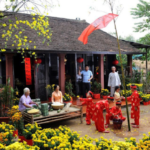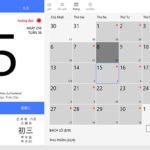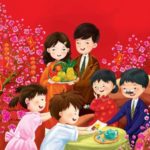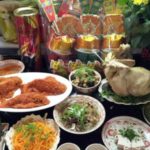The Qingming Festival is one of the 24 solar terms in the lunar calendar. The festival occurs after the end of the spring equinox. It usually starts on April 4th or 5th and ends on April 20th or 21st in the Gregorian calendar. Qingming is the season with the most pleasant weather, when the sky is clear and the weather is beautiful. It is a time of clear skies and tranquility. One of the traditional customs during Qingming is visiting the graves of ancestors in the countryside.
Tomb sweeping is when descendants bring offerings to the cemetery, burn incense, and clean and repair the graves of their ancestors. Tomb sweeping is a way for descendants to show their gratitude to their ancestors and it reflects the Vietnamese tradition of respecting one’s roots.
However, according to ancient beliefs and folk wisdom, the following individuals should avoid tomb sweeping to prevent bad luck and illness:
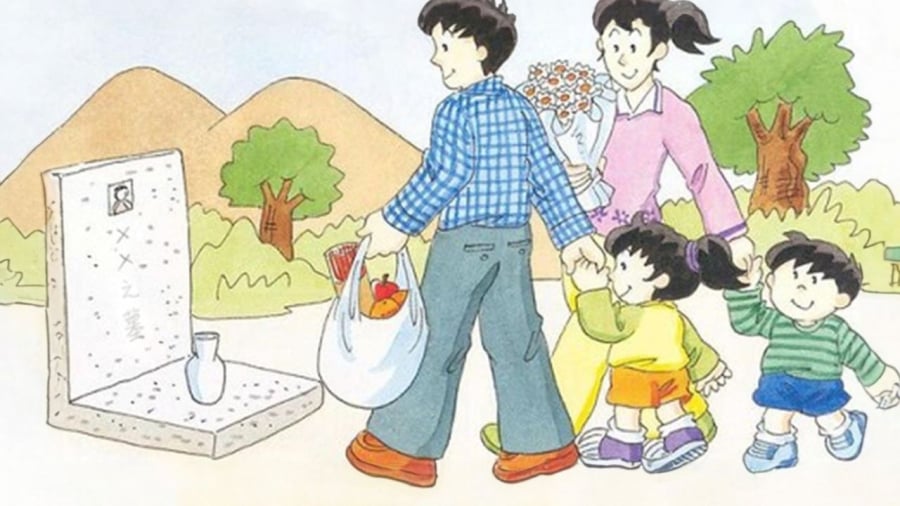
Tomb sweeping during Qingming is a beautiful tradition of the Vietnamese people
Pregnant women and nursing mothers
Women who are pregnant or breastfeeding should not participate in tomb sweeping. These individuals are more sensitive to their surroundings, especially in cold and spiritually charged environments like cemeteries. Pregnant women and nursing mothers are physically vulnerable and if they are exposed to negative energy, it can affect both them and their future.
In addition, pregnant women and nursing mothers should not visit cemeteries because the uneven terrain can make it difficult for them to walk, increasing the risk of falls and preterm labor. Moreover, cemeteries are believed to be inhabited by wandering spirits, which can disturb individuals who are already weak, such as pregnant women and mothers with young children.
Women during their menstrual cycle
Women during their menstrual cycle have increased yin energy and decreased yang energy, so it is not suitable for them to participate in tomb sweeping. They are more susceptible to negative energy entering their bodies. Moreover, according to ancient beliefs, women during their menstrual cycle are considered impure, so if they participate in tomb sweeping and lighting incense, they may be reprimanded by their ancestors and bring bad luck.
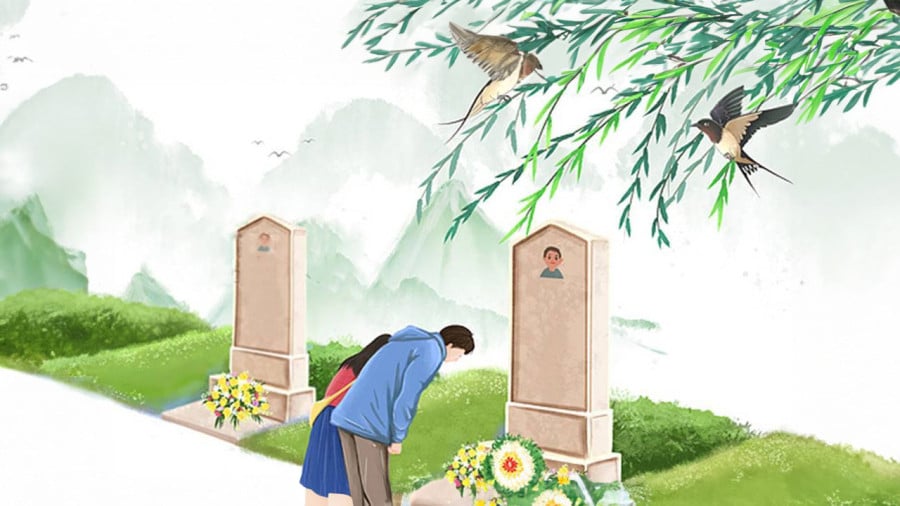
According to folk wisdom, there are people who should not participate in tomb sweeping to avoid illness and bad luck
People who are sick or undergoing medical treatment
Cemeteries have a lot of negative yin energy and are cold, so individuals who are sick or undergoing medical treatment are more prone to worsening conditions. These individuals are already weak, so when they are exposed to cold wind and emotional stress in cemeteries, it can further negatively impact their health. It is better for these individuals to seek places with positive yang energy to aid in their recovery and avoid increasing yin energy.
Elderly individuals
People who are over 70 years old should not participate in tomb sweeping because they are physically weak, with diminished yang energy. Their participation in tomb sweeping can increase yin energy and further weaken their health. The uneven terrain in ancient cemeteries also poses a risk of falling for the elderly. Additionally, elderly individuals often think about their ancestors and contemplate death, so participating in tomb sweeping may not bring good fortune to their families.
Individuals within the first three years of grieving
In ancient times, it was believed that individuals should mourn for three years, and during this time, the tomb remains green and intact. Women who want to remarry would not be considered as bringing bad luck. Therefore, women in the first three years of widowhood should not participate in tomb sweeping to avoid gossip and make it difficult for them to remarry. However, nowadays, this belief has changed, and women in the early stages of grieving can participate in tomb sweeping to visit their husbands’ graves.
Children under the age of 3
Children are even more physically fragile and do not yet understand the concept of tomb sweeping, so they can easily be affected by the cold air. Folk beliefs also suggest that young children are more susceptible to being disturbed by spirits, which can make them ill and experience nightmares when they sleep. Children may unknowingly engage in inappropriate behavior, such as urinating or stepping on the offerings and incense on the grave. These actions can unintentionally lead to scolding from ancestors, causing illness, restless sleep, and nightmares. Therefore, it is best not to bring very young children to tomb sweeping activities.
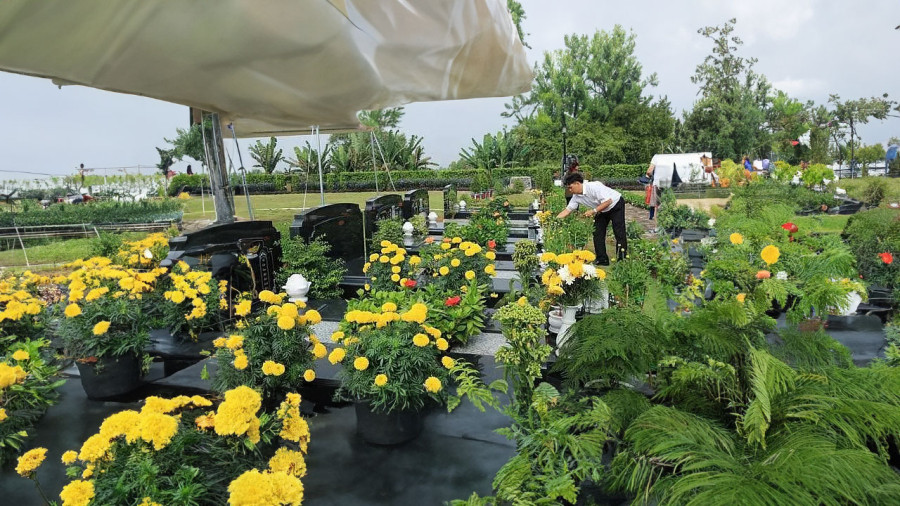
Tomb sweeping during Qingming Festival reflects the Vietnamese tradition of respecting one’s roots
Sons-in-law should not participate in tomb sweeping at their wives’ ancestral graves
According to traditional beliefs, sons-in-law do not have a direct blood connection to their wives’ families, so they should not participate in tomb sweeping. Ancestors should be worshipped and taken care of by sons and daughters-in-law. The ritual offerings and ceremonies should be carried out by sons. Therefore, in the past, sons-in-law did not participate in tomb sweeping. However, nowadays, tomb sweeping can also serve as an introduction for the ancestors to new family members, such as daughters-in-law and sons-in-law. It is also an opportunity for daughters-in-law and sons-in-law to understand their family heritage. Therefore, this belief varies depending on each family and region.
The above-mentioned individuals should avoid tomb sweeping according to popular folk beliefs. However, the specific practices can vary depending on each family’s customs, regional traditions, and personal preferences. Nowadays, cemeteries have become more well-maintained and cleaner compared to the past, making tomb sweeping activities more convenient. Therefore, it is important to be flexible and avoid causing unnecessary tension within the family.
This information is for reference only.
- Pregnant women and nursing mothers: Due to their heightened sensitivity and physical vulnerability, they may be affected by negative energy, and the uneven cemetery terrain may pose risks to their safety.
- Women during their menstrual cycle: With increased yin energy and decreased yang, they are more susceptible to negative influences, and according to ancient beliefs, their impure state may invite reprimand from ancestors.
- People who are sick or undergoing medical treatment: The abundance of negative yin energy and cold conditions in cemeteries can worsen their health.
- Elderly individuals (over 70): Their physical weakness and diminished yang energy make them more susceptible to the negative influences of the environment, and they are at a higher risk of falling in uneven terrains.
- Individuals within the first three years of grieving: In ancient times, it was believed that widows should mourn for three years, and participating in tomb sweeping during this period might invite gossip and hinder their chances of remarrying.
- Children under the age of 3: They are physically fragile and may be disturbed by spirits, leading to illness and nightmares. They may also unknowingly engage in disrespectful behavior at the gravesite.
- Sons-in-law: According to traditional beliefs, they lack a direct blood connection to their wives’ families and should not participate in ancestral rituals.
7 Appropriate and Practical Lunar New Year Gifts for Teachers
With Lunar New Year just around the corner, what better way to express your appreciation to your teachers than with a special gift? Choosing the right gift can be tricky, so let Dien May XANH help you out! Here, we have hand-picked 7 luxurious yet suitable gifts that you can give to your teachers this Tet. Check them out now!
2023 Seventh Month Kitchen God Offering: Full Details Revealed
2023 marks an important spiritual milestone for many families as the seventh lunar month’s full moon day brings with it the customary worship of the Kitchen God. Find out the specific and intricate steps involved with the traditional Kitchen God worship ritual on the 23rd day of the twelfth lunar month.
























